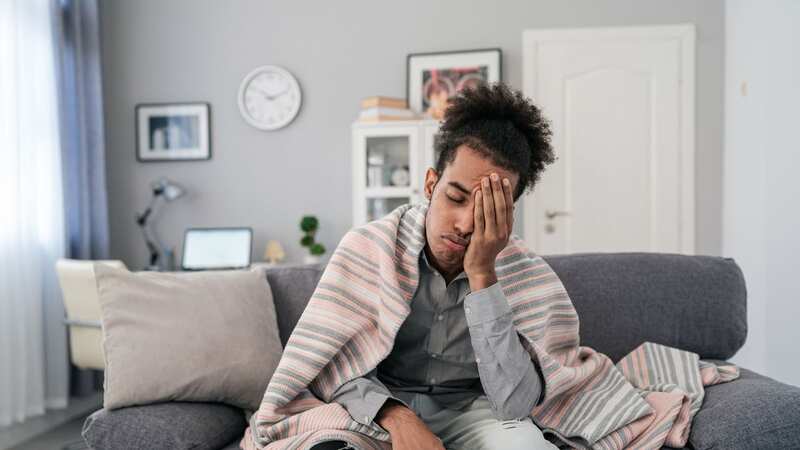10 most common types of headache and how you can treat each of them

Headaches are a common occurrence for many people, especially after a hard day at work or a booze-filled night.
But you may not know that headaches come in different forms, are caused by a range of issues, and can be treated in different ways. Some types of headaches simply require those suffering to relax, avoid looking at the screen or take certain medicines, but in some cases, you need to get medical advice.
It is estimated that around 45 million Americans complain of headaches each year - which works out to about one in every six people or 16.54% of the population. Here, we look at 10 different types of headaches, and what you can do to treat them.
READ MORE: Simple headache hack makes soreness disappear instantly - and doctor says it can work
 There are many different types of headache (Stock photo) (Getty Images)
There are many different types of headache (Stock photo) (Getty Images)Tension headache
Tension headaches are considered the most common type of headache, especially among adults and teenagers. They occur when the muscles of the scalp become tense - and can cause mild to moderate pain.
 Baby boy has spent his life in hospital as doctors are 'scared' to discharge him
Baby boy has spent his life in hospital as doctors are 'scared' to discharge him
While there is no specific cause, possible triggers can be caffeine, stress and sleep problems. They sometimes go away by themselves but if not, the recommended treatment is rest and relaxation. If they persist, you may consider taking painkillers such as paracetamol and ibuprofen.
Vision-induced headache
This type of headache can develop when the eyes are overworked - which could be due to the use of a computer, or wearing glasses/contact lenses with a new or wrong prescription. To cure it, you should consider cutting down your screen time, but if you believe your eyes could be the problem, you should also go for an eye test.
Migraine
Migraine is not just a bad headache, but a disabling neurological disease. The American Migraine Foundation estimates that at least 39 million Americans live with migraine, but because many people do not get a diagnosis or the treatment they need the actual number is probably higher.
 Migraines can be debilatating (Getty Images)
Migraines can be debilatating (Getty Images)It is characterised by pounding and throbbing pain which can last for up to three days - and can happen up to four times in four weeks, according to Alamo City Urgent Care, an emergency clinic in San Antonio, Texas. People with migraine also experience other symptoms such as nausea, light sensitivity, noise sensitivity, loss of appetite, and stomach upsets.
You should seek medical advice as prescription medication is often an option for those who experience migraine regularly. Lifestyle changes, such as cutting down on alcohol and smoking, are also recommended.
Cluster headache
Cluster headaches are considered the most severe, as patients experience intense pain around and sometimes behind their eyes. The pain is often throbbing and constant and in most cases, it is so severe that the patient cannot even stil still.
The name cluster is due to the fact that these headaches happen in groups - for example, patients get two cluster pains two times per day, each lasting for up to three hours. These need medical attention as painkillers are not enough to treat them. Treatment can involve high flow oxygen, triptans, and prophylactic medications such as beta blockers.
Medication-induced headache
Some people who take painkillers regularly - between 10 and 15 days per month - could be at risk of medication-induced headaches. These are typically caused by frequent use of triptans, ergotamines, opiates, non steroidal anti-inflammatory drugs (NSAIDs) and paracetamol.
Patients should seek support from their doctor. Options could include decreasing the use of the medicines causing the problem, or finding alternative medications.
Nerve pain headache
This type of headache can be excruciating as it is a sudden attack of severe and sharp pain that can last from a few seconds to about two minutes. They can be caused by several reasons such as pressure by an artery, tumour, talking, smiling, chewing, head movements, multiple sclerosis, shingles. You should speak to your doctor to investigate the cause and find appropriate treatment.
 Disabled woman paralysed after falling from wheelchair on plane walkway dies
Disabled woman paralysed after falling from wheelchair on plane walkway dies
Thunderclap headache
Thunderclap headaches need urgent care in A&E as they can be caused by life-threatening conditions including brain bleed, blood clot, stroke, meningitis and encephalitis. They start with severe pain out of the blue and can be accompanied by vomiting, fever, seizures and an altered mental state.
Pressure headache
There are a few different things that can cause a pressure headache - including coughing, sneezing, sexual intercourse or exercise - by increasing the pressure of blood vessels in the brain. This usually feels like a pulsating sensation that comes on quickly and lasts for short periods. To avoid these headaches, you should be aware of what can trigger them.
 Pressure headaches can be brought on by a variety of factors (Getty Images)
Pressure headaches can be brought on by a variety of factors (Getty Images)However, in some cases, pressure headaches can also be caused by an infection, haematoma, benign cancer or a malignant tumour. Dr Unnati Desai, national GP lead at Nuffield Health, told The Sun: "It is likely that you would be experiencing other neurological symptoms first, however, it is important to see your doctor to ensure that there is no underlying pathology."
Infection headache
If you have an infection or fever, you may experience some kind of headache. Painkillers are useful for patients with common infections, but in case of more serious conditions, such as meningitis, you should call an ambulance or to go the hospital immediately.
Trauma headache
Following a head injury, it is normal to have a headache. This can also cause trouble concentrating, memory problems and be sensitive to light and sound. The most common treatments include paracetamol, rest and avoiding alcohol.
However, if your headache gets worse despite taking painkillers, you should seek medical help due to the rare risk of developing internal bleeding affecting the brain. You should also call the emergency services if you experience persistent vomiting after 12 hours, drowsiness, confusion, weakness or hearing problems.
Read more similar news:
Comments:
comments powered by Disqus

































